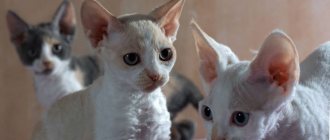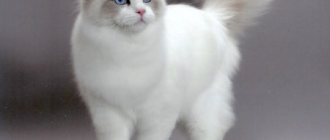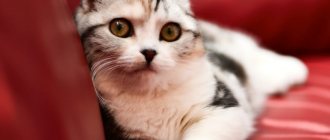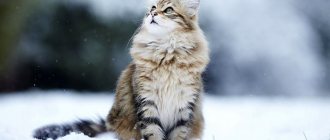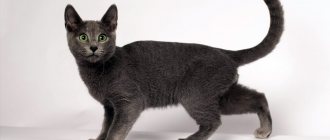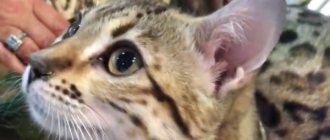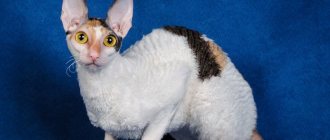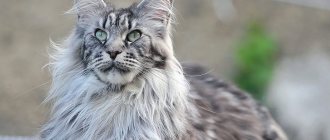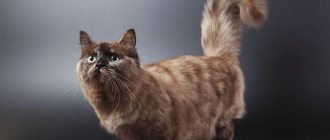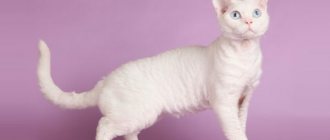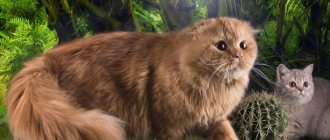Devon Rex is a young breed that has already gained popularity. With these beautiful, graceful animals, reminiscent of fairy-tale elves, you can forget about boredom and bad mood. Charismatic, handsome dogs, with huge, expressive eyes and large ears, become so attached to the owner that their devotion is compared to that of a dog and in common parlance representatives of the Devon breed are called Cotops.
A little history
The breed was bred in the county of Devonshire in the southwest of England, in the 60s of the 20th century, for which it received its name. A stray cat with unusual fur was spotted near an abandoned mine; it was not possible to catch him, but a domestic cat gave birth to several kittens from him.
Only one baby had the same beautiful fur as his father. The owner left the kitten, which later became the progenitor of the breed. In 1967, the breed was recognized by the European organizations GCCF and FIFe, described and brought to the standard. Later it was also recognized by the American associations CFA and TICA. Currently, the Devon Rex breed is independent and internationally recognized.
Health
If we generally evaluate the health status of this breed, then nature has awarded cats with strong immunity. Therefore, all diseases that may appear in a pet over time are genetic in nature.
Common genetic diseases:
- Congenital hypertrophy is the main hereditary disease, which is caused by the transmission of recessive genes (certain genetic information) to the offspring from the parents.
- Cardiovascular diseases – cardiomyopathy.
- Skin diseases that cause itching and infection. Antibacterial drugs are used to treat this disease. Skin diseases include dermatitis and urticaria, which manifests itself as small ulcers on the body.
- Joint diseases - most often hip dysplasia, which has negative consequences for the pet and can only be eliminated through surgery.
- Myopathy is an insidious disease that manifests itself in weakness of muscle tissue. The pet requires special attention at the age of 3 months to six months. This is the most acute period when the disease begins to manifest itself. If you carry out timely and correct treatment, you can avoid many unpleasant consequences.
In any case, the animal needs regular visits to the veterinarian, routine examinations, as well as other health procedures to maintain its health and life.
Characteristics and external features
Representatives of the breed are in many ways reminiscent of dogs; they also prefer to constantly be near a person, are highly trainable, have high intelligence, and know their nickname and the names of all family members. They get along well with children and other animals living near them.
They are curious, try to “help” with household chores (run for a vacuum cleaner or climb into the sink to wash dishes), love noisy, active games and large companies.
The disadvantage of the breed is its loud voice and constant meowing for any reason. Plus, the animals are hypoallergenic.
Devons have a strong build, long graceful limbs and a short, wavy, coarse coat, not found in any other breed. Their huge eyes and prominent cheekbones give them a resemblance to creatures from children's fairy tales.
Devon Rex Standards:
- The head is wedge-shaped, wide, cheekbones are well defined.
- The muzzle is short, the forehead is arched back, and the whisker pads are prominent. Enlarged cheeks are allowed in cats.
- The chin is developed, vertical with the line of the nose.
- A scissor bite, overshot or underbite are unacceptable.
- The neck is graceful, thin, and short.
- The ears are large, low set, tapering to rounded tips. At the base they are covered with more pancake hair. Tassels are allowed.
- The eyes are large, oval, far set, inclined towards the upper edge of the ears. Any color is allowed.
- The body is muscular, of medium length, thin bones, wide chest.
- Hind limbs are moderately thin, longer than the forelimbs.
- The paws are medium-sized, oval. The front paws have five toes and the hind paws have four.
- The tail is thin, long, completely covered with hair, and noticeably tapers towards the end.
- The coat is dense, without bald patches, the texture of the coat is soft, thick, elastic (without guard hairs), wavy.
- Color any color shades.
The life cycle is 12–15 years, adult weight: cat 2.7–3.6 kg; cat 3.6–4.6 kg.
Devon Rex character
Even though Rex appears arrogant in photographs, the Devon Rex has a very sweet personality. They are obedient and love communication. Moreover, they are so strongly attached to humans
that they resemble dogs. They constantly follow the owner to find out what he is doing. They really enjoy watching his every move. The pet will remind you of its presence by unobtrusively purring.
It is worth noting that Devons are incredibly curious
. They will always try to stick their nose where it shouldn't. To achieve their goal, they often use their anatomical features. Cats have amazingly flexible fingers, which they use in much the same way as humans use theirs. It’s easy for them to open a closet door or some kind of box. They are very inventive in solving such “puzzles”.
Representatives of the breed are not known for their independence. They love to sit on their owner's lap and often require his attention and affection. Sometimes they are so intrusive that they will even throw themselves on your shoulders. They have no understanding of tact or politeness. But for them this is just an attempt to show their sympathy; it’s just not always possible to dose out their love.
Rex's imagination is great. If you let your ward understand that his attention is not needed for now, he will find something to do with himself. The animal can play with any object; it will also happily jump from the closet to the bed and vice versa. Rexes show a special love for studying all kinds of boxes and cabinets, they also like to climb into the washing machine and so on. Pets can put themselves in great danger with their habits, so it is important to keep an eye on them.
They absolutely do not know how to cope with loneliness; you cannot leave them unattended for a long time. If you do not allow them to communicate with people, they will feel great discomfort and become withdrawn and nervous. After some time, their character will deteriorate to the point of impossibility.
Devons are not known for their jealousy. They treat other pets well and easily accept them into their company. True, some breeders argue that it is impossible to raise two cats of this breed in the same house, as they will literally fight each other for the love and attention of the owners.
A characteristic feature of Devons is their love of communication. They like to purr and purr, meow at different volumes to attract attention or simply out of boredom. Therefore, such cats are not suitable for people who do not like noisy animals.
Playfulness is inherent in both young kittens and older individuals. They will always play around and entertain their owner with their behavior. Cats often rustle bags or chase scraps of paper. They can run from morning to night, it’s amazing where they have so much energy. If something suddenly disappears, then you need to look at the behavior of the ward. Most likely, he has his own cache in which he stores all his “loot.”
To prevent your pet from destroying your apartment or house, it is advisable to buy a good play complex for him with a lot of entertainment. There the cat will be able to “discharge” its energy and will not harm the environment.
You cannot rudely scold cats or shout at them; they are very susceptible to impolite treatment and react to it painfully. They will be offended and will wonder why they deserved punishment or a rude shout. But most likely they won’t be able to understand anything.
Devons love to play with children, although most often they avoid their company. They will never scratch the child, and if necessary, they will gently let him know that they are already tired of communication.
During the period of sexual activity, animals are quite calm. They don’t mark their territory and don’t walk around the house screaming. Females are cleaner than males, but this difference is not too noticeable.
Features of care and maintenance
It is not difficult to care for Devonians; they themselves maintain the cleanliness of their coat. But in order for the pet to look well-groomed, the owner should not forget about the basic procedures for caring for the animal.
Hygiene procedures
The animal is regularly examined for rashes and inflammation of the skin. Wash as needed using a special high-quality shampoo for cats with short hair. Excess moisture is removed with a towel.
With proper training in water procedures, your pet will experience real pleasure from bathing.
Basic care procedures are as follows:
- Eyes are cleaned as they become dirty with a cotton pad soaked in a special eye liquid purchased at a pet store or a weak chamomile decoction.
- The ears are inspected regularly and cleaned with a cotton swab or ear wipes and lotion. Preventative cleaning is carried out once a week.
- Teeth. For cleaning, use a soft toothbrush and special toothpaste for animals. If there is tartar, contact a veterinarian. Self-removal is strictly contraindicated.
- The claws are trimmed as they grow with nail scissors or a guillotine nail clipper.
- The wool is combed with a metal comb, carefully so as not to harm the skin. During the molting period, it is recommended to use a special rubber glove.
Devons are intended strictly for apartment living, because their short coat is not able to fully protect them from the cold. In winter, when temperatures are low, it is recommended to dress your pet in special clothing for cats.
Nutrition
The owner decides what to feed the animal. Devonians easily consume both dry food and natural food. The main thing is that it contains the necessary microelements and vitamins.
With natural nutrition, it is recommended to prepare a complete diet in compliance with the correct proportions and balance of proteins, fats and carbohydrates. It is difficult to create such a diet on your own, especially for novice cat lovers, so owners switch to premium ready-made dry and wet food. There must be a container of clean, fresh water next to the feeding bowl.
With a natural diet, the diet should contain:
- lean boiled beef or chicken;
- fermented milk and dairy products;
- vegetables and fruits.
It is not recommended to give the animal food from the table, sweets, smoked meats, raw fish with bones and pork.
Adult animals are fed twice a day, kittens 5-6 times.
Devonians are big eaters, so the owner must carefully consider the pet’s diet, especially if the animal is sterilized.
Toilet training
Usually purebred breeders try to toilet train the kittens themselves, but if they haven't done this, the owner does it himself. To begin with, choose a quiet place where they place a comfortable tray with low sides, filled with special filler for short-haired cats and kittens, so that the baby feels comfortable in it.
In order for the pet to quickly understand what is required of him, a piece of cloth soaked in urine is placed in the tray. Devons are smart, so it’s enough to show the place a few times and the kitten will only go to the toilet there.
As the kitten gets older, the owner can eventually replace the tray with a special toilet-house.
Feeding
This breed is not picky about food, so these animals can be fed both natural food and special feed.
The main thing is not to give them too fatty and salty, this can negatively affect the digestive system. As for the second option, it is better to choose high-grade feed.
Castration and sterilization
If breeding for some reason is not the main purpose of keeping a pet, the owner is recommended to sterilize the animal. In order not to harm the pet, the procedure is carried out when its reproductive system is fully formed.
It is recommended to sterilize a cat starting from 8 months, until the first heat occurs. Males are castrated between 10 months and 2.5 years.
It is important to carry out the operation before the age of two so as not to risk the pet’s health.
Sterilized animals fully recover after a few days after the operation, which subsequently has a beneficial effect on their psycho-emotional state.
Friendliness without embellishment
The second ambiguous character trait of the Devons is their friendliness. Since these cats really cannot stand loneliness, compassionate owners often give their pet a companion, or even several at once. Here's what it looks like in the best case:
– How many Devons to have is a personal choice. If the area of our apartments allowed, we could have a lot of them, they are very clean... When there are two or more Devons, they have a lot of fun playing games. But then a small herd of mini-elephants rushes around the apartment.
But it happens that the “herd” does not work out. The character of each cat is individual, and it happens that when owners get a second pet, they do not solve the problem, but get a new one. Here is one such example:
– The older cat screams terribly, demanding affection and attention. Even at night, he can keep you awake for several hours with his suffering. All the time he tries to leave the apartment - the neighbors fall silent and feel great. Having read the advice, I play with him all the time, pet him, and pick him up. At the same time, the little girl turns from a playful, active kitten into a calm and sad one. I don't know what to do. Don't start a third Devon now!
Breeding secrets
The first mating is carried out after the completion of growth, development and full formation of the genital organs of animals. The best option is 10–15 months of age, but no later than one and a half years. It is recommended to skip the first two heats of a cat.
The duration of pregnancy is 60–65 days, counting from mating. Childbirth is quite easy, without complications. There are usually no more than four kittens in a litter.
Breeding Devon Rex cats has its own characteristics. One of them is related to the need to take into account blood type. It is important to choose the right animals for mating, which is carried out only inside the nursery.
Conclusions about the breed
The beautiful Devon Rex cat is immediately memorable for its appearance.
What answer can be given to the question, what kind of creature is the Devon Rex?
- a strikingly beautiful creature with a luxurious fur coat;
- piercing huge eyes on a trusting and curious face;
- good cat health and a small number of diseases;
- some difficulties with knitting, which is better left to specialists rather than amateurs;
- The playfulness of such an intelligent creature goes well with sociability.
Rexies are loved all over the world, and today this breed is becoming increasingly popular.
Choosing a kitten
A kitten should be purchased only from well-known nurseries that professionally breed this particular breed. Before purchasing, the future owner should study the characteristics of Devonians, consult with breeders and visit cat shows.
The baby must be at least 12 weeks old, pedigree, healthy, active, mentally stable and vaccinated according to age.
How to choose a kitten
When choosing a Devon Rex kitten, you need to pay attention to some factors:
- The optimal price, depending on the class, ranges from 15,000 rubles to 35,000. This is influenced by the pedigree and color of the animal.
- You can buy a kitten from a nursery no earlier than 3-4 months from birth.
- It is necessary to choose a reliable and trusted nursery or breeder from which the animal will be purchased.
It is necessary to pay attention to the activity, playfulness, and health of the animal. It is better to choose a baby who makes good contact with people. The animal must have a pedigree, passport, and vaccination marks.
Name for Devon Rex
The table below presents popular names for cats and cats, from which you can choose the one that suits your liking.
Names for cats and cats.
Here you can read how to choose names for Scots.
Price
Devonians are considered one of the rare and expensive breeds; the price for a purebred animal varies from 40,000 rubles and above. The price is affected by the class and color of the kitten.
If an animal has a rare color and curly hair, its price increases significantly. A kitten from a random mating and without a pedigree can be bought from 20,000 rubles, but in this case the owner is not insured against hereditary defects and diseases of the animal.
The Devon Rex is a wonderful companion and devoted friend. It will brighten up gray everyday life, give a good mood to children and adults and become an exotic and bright decoration for the home.
Vaccinations
All our four-legged friends are required to receive vaccinations in order to protect them from various infectious diseases. Vaccination is carried out regardless of what lifestyle the pet leads. Even if your tailed friend never leaves the walls of his home, there is still a possibility that he may become infected.
Pathogenic microbes and dangerous viruses enter the home on people’s clothes and shoes. The breeder is obliged to protect his furry pet.
The main condition for vaccination is the absence of any current diseases. To make sure of this, the cat is taken to see a veterinarian. The doctor conducts an examination, takes tests and gives an opinion on the pet’s health condition.
Vaccinations represent a serious test for an animal's immune system. Any hidden illnesses can lead to serious complications.
At least ten days before the planned vaccination date, the cat is dewormed. Every year, Devon Rex are vaccinated against calicivirus, panleukopenia, rhinotracheitis and rabies. An individual vaccination schedule agreed with the veterinarian is allowed.
